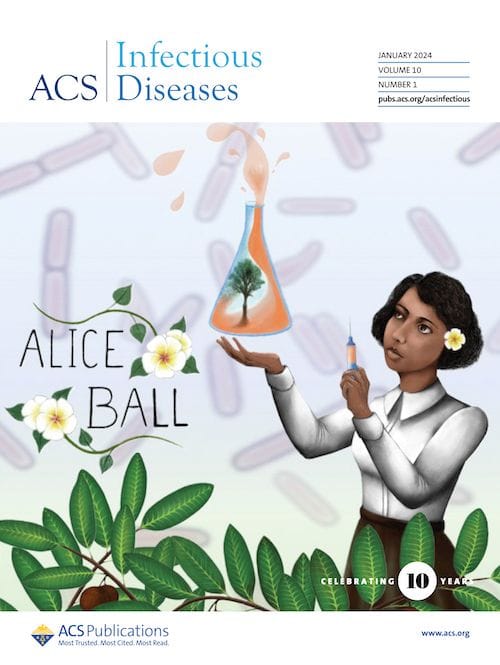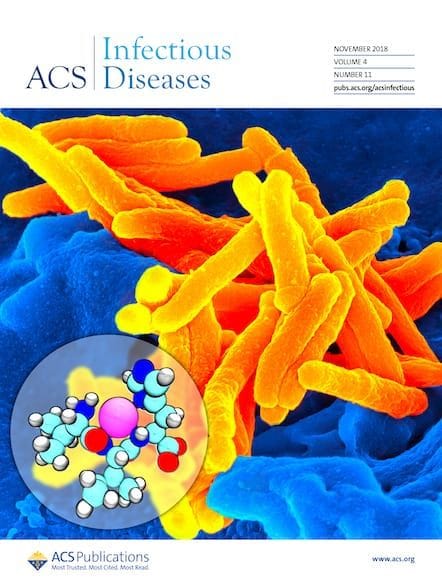As part of the journal's 10th Anniversary celebration, we are recognizing 20 exceptional reviewers who have consistently demonstrated excellence in peer review over the past decade.

Peer review is a crucial part of the publishing process. It ensures the research published falls within the journal scope, meets the high standards expected at the journal, and is valid and accurate. Journals rely on experts in the field to commit their valuable time to this process and to provide fair and constructive feedback to submitted manuscripts.
In 2024, ACS Infectious Diseases has been undertaking several initiatives in honor of the journal’s 10th anniversary. We want to take this opportunity to express our gratitude to all our reviewers who have contributed to peer review since the journal’s establishment in 2015. While thousands of reviewers have provided feedback to authors, we would like to recognize our “Star Reviewers” for ACS Infectious Diseases over the past ten years. These individuals have consistently agreed to reviewing manuscripts at a high level, and for this we are thankful. As Editor-in-Chief, Jayanta Haldar remarks in his Editorial, “Their efforts and dedication are an asset to the journal, and to our research community.”
ACS Infectious Diseases “Star Reviewers” 2024
- Eric Brown, McMaster University, Canada
- Lori Burrows, McMaster University, Canada
- Karen Bush, Indiana University Bloomington, United States
- Emily Derbyshire, Duke University, United States
- Cynthia Dowd, George Washington University, United States
- Francisco-Javier Gamo, GlaxoSmithKline, Spain
- Sylvie Garneau-Tsodikova, University of Kentucky, United States
- Damian Krysan, University of Iowa, United States
- Richard Lee, St. Jude Children's Research Hospital, United States
- Hongmin Li, The University of Arizona College of Pharmacy, United States
- Nathaniel Martin, Leiden University Institute of Biology Leiden, Netherlands
- Christian Melander, University of Notre Dame, United States
- Ranjana Pathania, Indian Institute of Technology Roorkee, India
- Chunquan Sheng, Second Military Medical University, China
- Herman Sintim, Purdue University, United States
- Tony Velkov, Monash Institute of Pharmaceutical sciences, Australia
- Jonathan Vennerstrom, University of Nebraska, United States
- Jun Wang, Rutgers, The State University of New Jersey, United States
- Zhengqiang Wang, University of Minnesota, United States
- William Wuest, Emory University, United States
We recently caught up with some of these reviewers to learn more about their areas of expertise and what drives them to review for ACS Infectious Diseases:
Emily R. Derbyshire, Duke University, United States
Learn more about Prof. Derbyshire's research
How has your experience as a reviewer (and/or author) for ACS Infectious Diseases been?
I have had great experiences both as a reviewer and author for ACS Infectious Diseases. As an author, I appreciated timely and thoughtful reviewers that were weighed fairly by an editor with relevant expertise. As a reviewer, I have felt my time was appreciated and my comments were thoughtfully considered in publication decisions.
What motivates you to contribute to peer review?
Peer review is a critical step to ensuring the integrity of scientific publications. I have greatly appreciated thoughtful and helpful evaluations that have improved the rigor and accessibility of our findings. These experiences motivate my contributions to peer review, where I aim to encourage excellence in science and promote all of the authors behind the manuscripts.
How do you look at the field of infectious diseases in the coming decade?
Emerging pathogens, local outbreaks, and the global pandemic all underscore the significance and impact of infectious diseases. I think these diseases will continue to greatly shape our lives and inspire technological and foundational advancements in the coming decade.
Francisco-Javier Gamo, GlaxoSmithKline, Spain
How has your experience as a reviewer (and/or author) for ACS Infectious Diseases been?
For more than 15 years I have participated (and am still active) as a reviewer for a number of different journals including ACS Infectious Diseases. I can assure that ACS Infectious Diseases is one of my favorite options when I need to prioritize, and this is because of the quality of the manuscripts not only from the scientific point of view but also because of written language and format for review. Usually, when I am invited to review, the scope of the manuscript is fully under my area of expertise. I think that role of the different editors here is key, and they are doing a wonderful job.
What motivates you to contribute to peer review?
I feel that is a good way of contributing to support science in general. From a personal point of view, I feel the challenge of assessing the work others are doing contributes to self-criticism and in the end can improve your own work.
How do you look at the field of infectious diseases in the coming decade?
Infectious diseases have been one of the most important fields for Global Health in the recent years and I think the importance in the future will even increase because society still pending on controlling terrible diseases like malaria or tuberculosis and the emerging threat of antimicrobial resistance is a reality that probably will worsen the situation.
Hongmin Li, The University of Arizona, United States
Learn more about Dr. Li's research
How has your experience as a reviewer (and/or author) for ACS Infectious Diseases been?
As an author and reviewer for ACS Infectious Diseases, my experience has been highly rewarding. The journal maintains rigorous standards for scientific excellence and provides a platform for cutting-edge research in infectious diseases. The peer review process is thorough and constructive, ensuring the publication of high-quality studies. As a reviewer, I appreciate the opportunity to contribute to the scientific community by evaluating innovative research and providing feedback to authors. The editorial team is professional and supportive, facilitating a smooth submission and review process. Overall, my involvement with ACS Infectious Diseases has been intellectually stimulating and professionally fulfilling.
What motivates you to contribute to peer review?
I am motivated to contribute to peer review by the desire to advance scientific knowledge, improve the quality of research publications, and support fellow researchers. Engaging in peer review also enhances my own expertise and keeps me abreast of the latest developments in my field.
How do you look at the field of infectious diseases in the coming decade?
In the coming decade, the field of infectious diseases will likely see significant advancements in pathogen detection, vaccine development, and antimicrobial/antiviral therapies. Increased global collaboration and integration of AI and genomic technologies will enhance our ability to predict, prevent, and combat emerging infectious threats, ultimately improving public health outcomes.
Nathaniel I. Martin, Leiden University, Netherlands
Learn more about Prof. Martin's research
How has your experience as a reviewer (and/or author) for ACS Infectious Diseases been?
It’s been a great pleasure to serve as a reviewer for ACS Infectious Diseases over the past decade. The editorial team are very professional and supportive to both authors and reviewers and ensure clarity and fairness to all manuscripts submitted.
What motivates you to contribute to peer review?
From its inception, I’ve found ACS Infectious Diseases to be a particularly attractive venue for researchers like myself who have a strong chemistry component to our anti-infectives research. Serving as a reviewer also provides a means to ensure the high quality of the journal is maintained while also giving me a front row seat to the latest advances in the field.
How do you look at the field of infectious diseases in the coming decade?
The continued emergence of drug resistant pathogens makes clear the need to keep pace with infectious disease. The field of chemistry is, and will continue to be, central in addressing this challenge!
Ranjana Pathania, Indian Institute of Technology Roorkee, India
Learn more about Prof. Pathania's research
How has your experience as a reviewer (and/or author) for ACS Infectious Diseases been?
My experience as a reviewer and author for ACS Infectious Diseases has been highly enriching and rewarding. The journal's dedication to high-quality research and rigorous peer review ensures that each published article makes a significant contribution to the field. As a reviewer, I am consistently impressed by the innovative approaches and meticulous research conducted by my peers. The highly supportive and professional editorial team ensures a smooth and rewarding process. As an author, I have greatly benefited from the constructive feedback, which has enhanced the quality of my work. Overall, ACS Infectious Disease fosters a collaborative and intellectually stimulating environment that advances our understanding of infectious diseases.
What motivates you to contribute to peer review?
Peer review of research papers is crucial for the research community, exposing reviewers to cutting-edge work and allowing them to provide valuable, constructive criticism. Reviewers are essential to scientific advancements and have a significant influence on humanity's progress. Although the review process can often feel like a thankless job, it's gratifying to see that ACS Infectious Diseases appreciates and recognizes these dedicated efforts.
How do you look at the field of infectious diseases in the coming decade?
Antibiotic resistance makes treating infectious diseases more difficult and continues to be a global concern. However, advances in molecular diagnostics, targeted therapies, and understanding resistance mechanisms and virulence offer promising solutions. In the coming decade, I anticipate a shift towards more precise approaches like chemical genetics and targeted therapies for managing infectious diseases. While the landscape of infectious diseases will undoubtedly evolve, proactive research and innovation hold the key to addressing these challenges effectively.
Chunquan Sheng, Second Military Medical University, China
How has your experience as a reviewer (and/or author) for ACS Infectious Diseases been?
I have reviewed 220 papers for ACS Publications including 27 manuscripts from ACS Infectious Diseases. I have also published four articles in the journal. The subjects of most papers I published or reviewed are in the field of antifungal agents. Based on my experience, I feel the quality of articles is steadily increasing in recent years.
What motivates you to contribute to peer review?
I am an Editorial Advisory Board member of ACS Infectious Diseases and it my responsibility to contribute as a reviewer. Also, the peer review experience is helpful for receiving the cutting-edge progress in the infectious field and provides a good opportunity to communicate with excellent scientists.
How do you look at the field of infectious diseases in the coming decade?
Considering increasing attention in the infectious diseases, I think the applications of interdisciplinary technologies (e.g. artificial intelligence) will be helpful to better understanding the mechanisms of infection and the development of novel anti-infectious agents.
Herman O. Sintim, Purdue University, United States
Learn more about Prof. Sintim's research
How has your experience as a reviewer (and/or author) for ACS Infectious Diseases been?
Reviewing for ACS Infectious Diseases has become a pastime for me because of the high-quality manuscripts that are sent my way to review. The review process has been fair, and authors are given the opportunity to address or rebut comments. As an author, I have found the process of submitting a manuscript and getting a paper published to be smooth. The time to first decision is also reasonable. Reviewers' comments have been fair and most importantly the comments have been useful and often have improved my manuscripts.
What motivates you to contribute to peer review?
Reviewing manuscripts keep me updated on new discoveries in my field. I publish about eight to ten manuscripts each year, meaning that about 30 other scientists also review my work. Thus, I think that it is only fair that I also do my review duty. Most scientists are inspired by prior works by others. Often, we start a new project after reading about discoveries by others. It is therefore important that published works are sound, and the experimental sections are rigorous. Without proper and detailed peer review, the quality of published works, which we all depend on to advance our programs, would be poor.
How do you look at the field of infectious diseases in the coming decade?
Past efforts in the infectious disease area have disproportionally focused on processes that are unique to the pathogen, hoping to kill the pathogen with minimal effects on the host. However, there are many processes in the host that either accentuate or attenuate the infection process. In the coming decade, we could see more strategies that co-opt the host's machinery to eliminate pathogens being translated. Secondly, the role of the immune system in curbing infections has long been recognized and numerous vaccines have been successfully deployed. As our understanding of innate and adaptive immunity expands, I foresee the development of novel vaccine adjuvants being developed for infectious diseases.
Jun Wang, Rutgers University, United States
Learn more about Prof. Wang's research
How has your experience as a reviewer (and/or author) for ACS Infectious Diseases been?
I have published six papers in ACS infectious Diseases. I enjoyed the speedy review process. The review comments are constructive, respectful, and professional. In return, it is my obligation to serve as a reviewer to contribute to the scientific community. The manuscripts I reviewed match my expertise, and I appreciate the handing editors’ efforts in soliciting appropriate reviewers. This also provides me with confidence that my manuscripts will be handled professionally in an unbiased manner. I will continue submit our work to ACS Infectious Diseases and look forward to playing a bigger role in peer review.
What motivates you to contribute to peer review?
With the exponential growth of scientific publications, it is essential for active researchers to participate in peer review to ensure high-quality and vigorous results get published in mainstream journals such as ACS Infectious Diseases. Publications reporting premature results that are not reproducible or lack scientific rigor are misleading and should be filtered in peer review.
How do you look at the field of infectious diseases in the coming decade?
The COVID-19 pandemic is a timely reminder of the urgent need of anti-infective drugs, especially oral drugs against pathogens with a pandemic potential. With the advent of artificial intelligence and machine learning, I expect the field will make faster progress in understanding the replication mechanism of pathogens and the development of clinical candidates.
Zhengqiang Wang, University of Minnesota, United States
Learn more about Prof. Wang's research
How has your experience as a reviewer (and/or author) for ACS Infectious Diseases been?
My experience reviewing for ACS Infectious Diseases has been professional, collegial, and positive. The two-week turnaround time and the email reminder are standard but good practices. On a few occasions when I needed extra time, the Editor would be accommodating. Most importantly, I feel that a unique strength of the editorship is the attentiveness which manifests in two notable aspects: 1) Appropriate assignments. Being an antiviral researcher, I have been assigned manuscripts almost exclusively in the areas of antiviral research; 2) Pre-review guidelines. A few times the editor would provide a couple of key points for me to focus my review on.
What motivates you to contribute to peer review?
- I consider peer review an important part of my professional service to the research community. I strive to provide fair and constructive reviews and expect the same for my own manuscripts;
- The opportunity to preview some excellent scientific work;
- To support colleagues who are taking on the editorial roles.
How do you look at the field of infectious diseases in the coming decade?
COVID has shown once again the threat of viral pandemics to human health and lives and raised the awareness about emerging and remerging viruses with pandemic potentials. In the coming decade, resources allocated to and scientific interest in research and development toward viral pandemic preparedness will likely increase.
William M. Wuest, Emory University, United States
Learn more about Prof. Wuest's research
How has your experience as a reviewer (and/or author) for ACS Infectious Diseases been?
Over the past decade, my group has personally benefitted tremendously from the journal. The expedited review time, critical feedback, and visibility our work has gained has been vital to the success of both me and my students. I have also enjoyed the streamlined and straightforward reviewing process that has allowed me to provide succinct and expedited feedback to other authors in our field.
What motivates you to contribute to peer review?
As a published author, I feel it is my duty to give back as my papers would not have been possible without the efforts of others in the field. I am also further motivated to both expedite and support our junior colleagues, whose careers are based on publishing and time is particularly limited.
How do you look at the field of infectious diseases in the coming decade?
We are currently at the precipice of several infectious disease outbreaks, whether it be viral pandemics, pan-resistant bacterial or fungal infections, or tropical diseases. This will only be further exacerbated by limited investment from industry, making academic research even more important.

